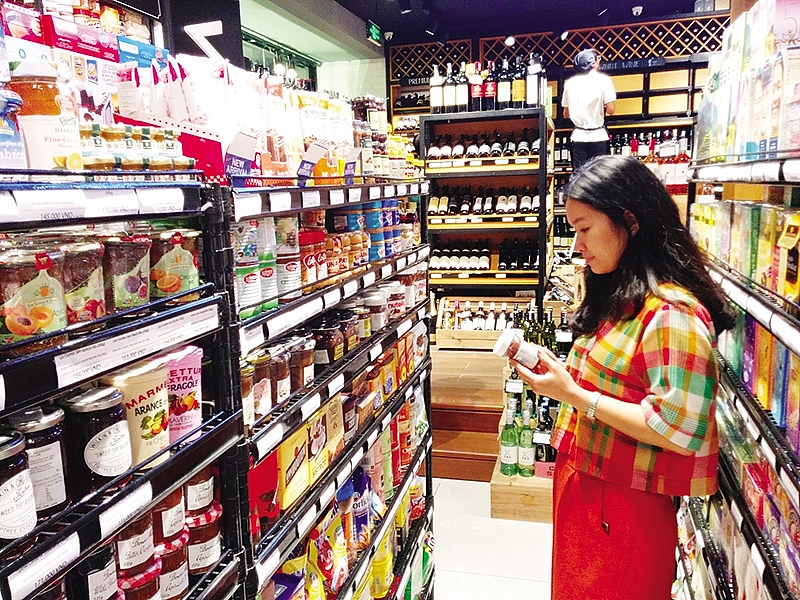Vietnam to push on EU trade deal
 |
| Vietnam has become the EU’s second-biggest trading partner in ASEAN, after Singapore, Photo: Le Toan |
For one week from October 14, Prime Minister Nguyen Xuan Phuc will visit Austria before flying to Brussels to attend the 12th Asia-Europe Meeting Summit (ASEM) and visit Belgium and the EU. His final stop will be a trip to Denmark where he will attend the P4G Copenhagen Summit 2018, aimed at discussing sustainable development goals through innovative partnerships.
One of the main targets of these visits, in addition to cementing further economic, trade and investment ties, is Vietnam working with leaders of these nations - with Austria currently holding the presidency of the Council of the European Union - on the possibility of the EU-Vietnam Free Trade Agreement (EVFTA) being signed later this year. It is hoped it could be ratified in the first quarter of 2019, before the next elections to the European Parliament scheduled to be held next May.
PM Phuc will also meet with the heads of many European companies from these nations, wishing to expand business and investment in Vietnam in anticipation of the EVFTA.
In Austria during October 14-16, the governments and businesses of the two countries will likely clinch around 11 co-operation deals, focusing on the areas of health care, e-government, hydroelectricity, fibre optics, e-learning, and banking.
Meanwhile in Belgium, where PM Phuc will stay during October 16-19, six deals are expected to be signed, focusing on co-operation in the sectors of agriculture, food hygiene and safety, and seaport development. For example, Belgium’s Rent-A-Port Group is expected to sign a deal with Vietnam’s Hateco to upgrade Haiphong Port in the north of Vietnam. Rent-A-Port will also likely ink another deal with a domestic partner to develop Lach Tray Port in Haiphong.
During PM Phuc’s October 19-21 visit to Denmark, he will be expected to witness the signing of seven co-operation deals, concentrated on the sectors of food hygiene and safety, finance, labour, and energy.
These deals with the three nations are expected to help Vietnam lure more investment from them, and expand its trade.
As of September 20, Vietnam had 31 valid Austrian investment projects registered at $144 million, 68 Belgian projects ($912.5 million), and 132 Danish projects ($417.3 million). Vietnam also boasted 2,141 European investment projects with the total registered capital of $24.2 billion, making the EU the fifth-largest foreign investor of Vietnam after South Korea, Japan, Singapore and Taiwan.
Currently, Vietnam also has 94 projects in the EU, registered at $207.4 million.
According to the General Statistics Office, Vietnam has become the EU’s second biggest trading partner in the ASEAN, after Singapore and ahead of Malaysia, with trade worth $50.3 billion in 2017. The figure hit $41.1 billion in the first nine months of this year, with Vietnam enjoying a trade surplus of $21.1 billion.
The EVFTA will eliminate over 99 per cent of tariffs. Vietnam will lift 65 per cent of import duties on EU exports to the country at entry into force, with the remainder of duties being gradually eliminated over a 10-year period. Meanwile, the EU will remove tariffs over a seven-year period.
The agreement also covers non-tariff barriers to trade and other trade-related aspects such as public procurement, regulatory issues, competition, services, investment, intellectual property rights, and sustainable development.
According to Cecilia Malmström, EU Trade Commissioner, the EVFTA is “a great opportunity for European exporters.” “Vietnam is one of the fastest growing countries in Southeast Asia, a market with significant potential for the EU’s agricultural, industrial and services exports,” she said.
During PM Phuc’s attendance at the ASEM Summit, which will bring together heads of state or government of 51 European and Asian countries as well as representatives of the EU, he and other leaders will focus discussions on the theme of “Europe and Asia: Global Partners for Global Challenges”.
The leaders will seek to strengthen dialogue and co-operation between the two continents on a wide range of areas, including trade and investment, connectivity, sustainable development and climate, along with security challenges such as terrorism, cyber-security, and irregular migration.
What the stars mean:
★ Poor ★ ★ Promising ★★★ Good ★★★★ Very good ★★★★★ Exceptional
Themes: EVFTA & EVIPA
Related Contents
Latest News
More News
- Japanese business outlook in Vietnam turns more optimistic (January 28, 2026 | 09:54)
- Foreign leaders extend congratulations to Party General Secretary To Lam (January 25, 2026 | 10:01)
- 14th National Party Congress wraps up with success (January 25, 2026 | 09:49)
- Congratulations from VFF Central Committee's int’l partners to 14th National Party Congress (January 25, 2026 | 09:46)
- 14th Party Central Committee unanimously elects To Lam as General Secretary (January 23, 2026 | 16:22)
- Worldwide congratulations underscore confidence in Vietnam’s 14th Party Congress (January 23, 2026 | 09:02)
- Political parties, organisations, int’l friends send congratulations to 14th National Party Congress (January 22, 2026 | 09:33)
- Press release on second working day of 14th National Party Congress (January 22, 2026 | 09:19)
- 14th National Party Congress: Japanese media highlight Vietnam’s growth targets (January 21, 2026 | 09:46)
- 14th National Party Congress: Driving force for Vietnam to continue renewal, innovation, breakthroughs (January 21, 2026 | 09:42)

 Tag:
Tag:
















 Mobile Version
Mobile Version